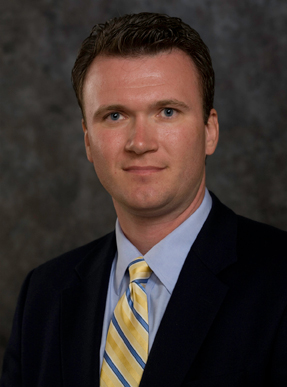Professor Writes Ethics Guidebook for Arkansas Educators
FAYETTEVILLE, Ark. – When clear-cut ethical violations occur such as a teacher drinking alcohol on school grounds or a coach having an inappropriate relationship with a student, the results are usually in the newspaper and on local television. However, educators deal with less newsworthy ethical dilemmas every day when trying to decide what is best for students, said John Pijanowski, and the University of Arkansas professor has co-written a book to help educators who often find themselves confronted with decision-making in gray areas.
Pijanowski is an associate professor of educational leadership. Most of his students in the master's and doctoral programs in the College of Education and Health Professions are teachers and principals studying to advance in educational leadership.
Omni Publishers asked Pijanowski to write Professional Responsibility for Educators and the Arkansas Code of Ethics as part of its Educator Ethics Series. According to Pijanowski and co-author David Blacker of the University of Delaware, moral rigidity and tunnel vision seem a losing strategy for an educator dealing with the complexity and imperfection of actual classrooms and real-life students.
"This is part of a nationwide project to create textbooks to support the teaching of ethics in teacher-education programs and other educator-preparation settings," Pijanowski said. "We want to put people in the position of knowing what to do when confronted with an ethical dilemma or as the supervisor or peer of someone in that situation. The information in this book illustrates how easy it can be to cross ethical lines."
A recent college graduate searching for a teaching job violated the code of ethics when she engaged in flirtatious online conversation with a 16-year-old boy, according to one case study in the book. As a licensed educator, the young woman is obligated to act ethically and responsibly despite the fact that she was not a teacher at the boy's school. Another case study raises questions about what safeguards schools are obligated to have in place when teachers use digital media in their classrooms. Other case studies address when an educator may take gifts, finding that it's OK for participants at a conference to take a tote bag of educational samples but not for a principal to accept a free riding lawn mower from a company giving his school a good deal on several pieces of equipment.
In June 2008, the Arkansas Board of Education approved the Arkansas Code of Ethics for Educators. In this new book, Pijanowski and Blacker present the code, explain the legal framework surrounding it, present theories of ethics and offer case studies of ethical dilemmas faced by Arkansas educators. Identifying characteristics have been removed from actual ethical violations investigated by the Arkansas Professional Licensure Standards Board described in the case studies.
"The events are used to inform discussion," Pijanowski. "The book provides material that can be used to teach ethics in teacher-preparation programs and administrator-certification programs in Arkansas. It's in these gray areas that we can have the richest discussion with a class."
"Teachers and principals live in these gray areas every day," he continued. "There's no way around that when you work in the helping professions. For example, educators must decide how to allocate limited resources, and those decisions can have a huge impact on students."
The Arkansas Code of Ethics for Educators is based on seven standards of behavior: professional relationships with students, professional competence, honest reporting of data and other information, responsible stewardship of school property and funds, accepting gifts or favors, maintaining confidential records and possessing or being under the influence of alcohol or drugs on school grounds or at school-sponsored activities.
Pijanowski has researched the teaching and assessment of moral behaviors for several years, and he published findings from his research in the Journal of College and Character last year. His study found that dominant approaches to teaching ethics education have changed little in the past 15 years and that an integrated approach across the curriculum that incorporates moral learning theory is uncommon. Pijanowski believes the University of Arkansas has taken a leadership role in developing a stronger ethics curriculum for educational leaders. The faculty has designed a college ethics curriculum that emphasizes the development of moral reasoning skills and behaviors, he said.
Topics
Contacts
John Pijanowski, associate professor of educational leadership
College of Education and Health Professions
479-575-7019,
jpijanow@uark.edu
Heidi Wells, content writer and strategist
Global Campus
479-879-8760,
heidiw@uark.edu
Headlines
Affairs of the Heart
Find out how biomedical engineering professor Morten Jensen is developing innovative devices to produce better outcomes in cardiovascular medicine.
Students, Faculty and Alumni Kick Off Centennial Year of School of Law
Founded April 14, 1924, the School of Law faculty, students and alumni started the celebration of its centennial year with a Founders Day event and will continue with more commemorative events this coming fall.
Yearly Academic Award Winners, Ambassadors Recognized by Bumpers College
Schyler Angell, Lexi Dilbeck, Cason Frisby, Tanner Austin King, Anna Brooke Mathis, Carrie Ortel, Lucy Scholma, Kadence Trosper and student ambassadors were honored at the college's annual reception.
World Premiere of 'Cries from the Cotton Field' Slated for May 8
Cries from the Cotton Field chronicles the journey of 19th century Italian immigrants from northern Italy to the Arkansas Delta and ultimately to Tontitown. It will premier at 6 p.m. May 8 in Springdale Har-Ber High School.
Fay Jones School's Earth Day Event Spotlights Sustainable Materials and Projects
"One day doesn't seem like a lot, but one day can empower individuals and groups, energize them to work for change and innovate for transformative solutions," professor Jennifer Webb said of the students' design work.





